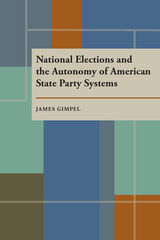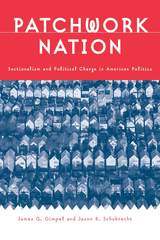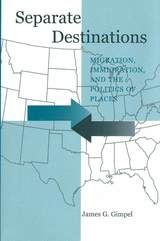3 books by Gimpel, James G.

National Elections and the Autonomy of American State Party Systems
James G. Gimpel
University of Pittsburgh Press, 1996
Traditional theories of party organization have emphasized two-party electoral competition as the force behind party unity in state politics. V. O. Key first advanced this theory in Southern Politics, where he concluded that party factionalism in the South was mainly attributable to the one-party character of the region. But this traditional theory does not fit all states equally well. In the states of the West, especially, parties are competitive, but political activity is centered on candidates, not parties.
The theory of candidate-centered politics allows Gimpel to explain why party factionalism has persisted in many regions of the United States in spite of fierce two-party competition. Using interviews, polling data, elections returns, and demographic information, Gimpel contends that major upheavals in the two-party balance of presidential voting may leave lower offices untouched.
[more]

Patchwork Nation
Sectionalism and Political Change in American Politics
James G. Gimpel and Jason E. Schuknecht
University of Michigan Press, 2004
The unprecedented geographic and socioeconomic mobility of twentieth-century America was accompanied by a major reshuffling of political support in many parts of the country. Yet at the dawn of the new century these local and regional movements are still poorly understood. How can we account for persistent political regionalism and the sectional changes that have radically altered the nation's political landscape, from the Sun Belt to the Rust Belt? Patchwork Nation retrieves this lost knowledge, restoring geography to its central role in our nation's political behavior.
"A primer on the importance of regional identity in the electoral system. ... [A]nyone interested in learning more about how America's diversity drives its political systems would do well to take a spin through Patchwork Nation."
---Meg Kinnard, NationalJournal.com
"Location, location, location. What matters in politics is not just who the voters are, but where they are. Just ask Al Gore. Or read this book, a compelling demonstration that geography is often destiny."
---Bill Schneider, Senior Political Analyst, CNN
"This accessible and well-written book challenges us to reflect on the role that political context plays in shaping the vote. By tracing how regional politics evolves over time within and across states, Gimpel and Schuknecht have revived the important but often neglected field of political geography."
---Donald Green, Yale University
"In the spirit of V. O. Key, Gimpel and Schuknecht make a fundamental contribution. They demonstrate that states and regions are not simply important as units of aggregation, but rather as complex political arenas with profound consequences for processes of democratic politics both within and beyond their boundaries."
---Robert Huckfeldt, University of California, Davis
"A primer on the importance of regional identity in the electoral system. ... [A]nyone interested in learning more about how America's diversity drives its political systems would do well to take a spin through Patchwork Nation."
---Meg Kinnard, NationalJournal.com
"Location, location, location. What matters in politics is not just who the voters are, but where they are. Just ask Al Gore. Or read this book, a compelling demonstration that geography is often destiny."
---Bill Schneider, Senior Political Analyst, CNN
"This accessible and well-written book challenges us to reflect on the role that political context plays in shaping the vote. By tracing how regional politics evolves over time within and across states, Gimpel and Schuknecht have revived the important but often neglected field of political geography."
---Donald Green, Yale University
"In the spirit of V. O. Key, Gimpel and Schuknecht make a fundamental contribution. They demonstrate that states and regions are not simply important as units of aggregation, but rather as complex political arenas with profound consequences for processes of democratic politics both within and beyond their boundaries."
---Robert Huckfeldt, University of California, Davis
[more]

Separate Destinations
Migration, Immigration, and the Politics of Places
James G. Gimpel
University of Michigan Press, 1999
Natives who change residence do not settle in the same places as immigrants. Separate Destinations argues that these distinct mobility patterns, coupled with record levels of immigration from impoverished third world nations, are balkanizing the American electorate. James G. Gimpel examines the consequences of different patterns of movement and settlement on the politics of the communities in which these different groups settle.
Newer immigrants are con-strained by a lack of education, money, English literacy, and information--and frequently by discrimination--to live in areas of coethnic settlement. Domestic, native-born migrants--predominantly Caucasian--free of discrimination and possessing more money and information, move where they wish, often to communities where immigrants are not welcome or cannot afford to live. Strong evidence suggests that spatially isolated immigrants are slower to naturalize and get involved in politics than domestic migrants.
Gimpel looks closely at states with very different patterns of migration and immigration: California, Colorado, Kansas, Kentucky, Florida, Pennsylvania, and New York. In these states, Gimpel shows the impact of population mobility on party registration, party votes, and voter turnout and asks whether population changes have changed the dominant party in a state or produced a political reaction from natives.
Separate Destinations contains a number of thematic maps detailing the settlement patterns of internal migrants and immigrants for both counties and census tracts. Blending insights from a number of social science disciplines, including economics, demography, sociology, political science, and anthropology, this book will be of interest to a wide and diverse readership of scholars, students, and policymakers.
James G. Gimpel is Associate Professor of Government, University of Maryland.
Newer immigrants are con-strained by a lack of education, money, English literacy, and information--and frequently by discrimination--to live in areas of coethnic settlement. Domestic, native-born migrants--predominantly Caucasian--free of discrimination and possessing more money and information, move where they wish, often to communities where immigrants are not welcome or cannot afford to live. Strong evidence suggests that spatially isolated immigrants are slower to naturalize and get involved in politics than domestic migrants.
Gimpel looks closely at states with very different patterns of migration and immigration: California, Colorado, Kansas, Kentucky, Florida, Pennsylvania, and New York. In these states, Gimpel shows the impact of population mobility on party registration, party votes, and voter turnout and asks whether population changes have changed the dominant party in a state or produced a political reaction from natives.
Separate Destinations contains a number of thematic maps detailing the settlement patterns of internal migrants and immigrants for both counties and census tracts. Blending insights from a number of social science disciplines, including economics, demography, sociology, political science, and anthropology, this book will be of interest to a wide and diverse readership of scholars, students, and policymakers.
James G. Gimpel is Associate Professor of Government, University of Maryland.
[more]
READERS
Browse our collection.
PUBLISHERS
See BiblioVault's publisher services.
STUDENT SERVICES
Files for college accessibility offices.
UChicago Accessibility Resources
home | accessibility | search | about | contact us
BiblioVault ® 2001 - 2024
The University of Chicago Press









